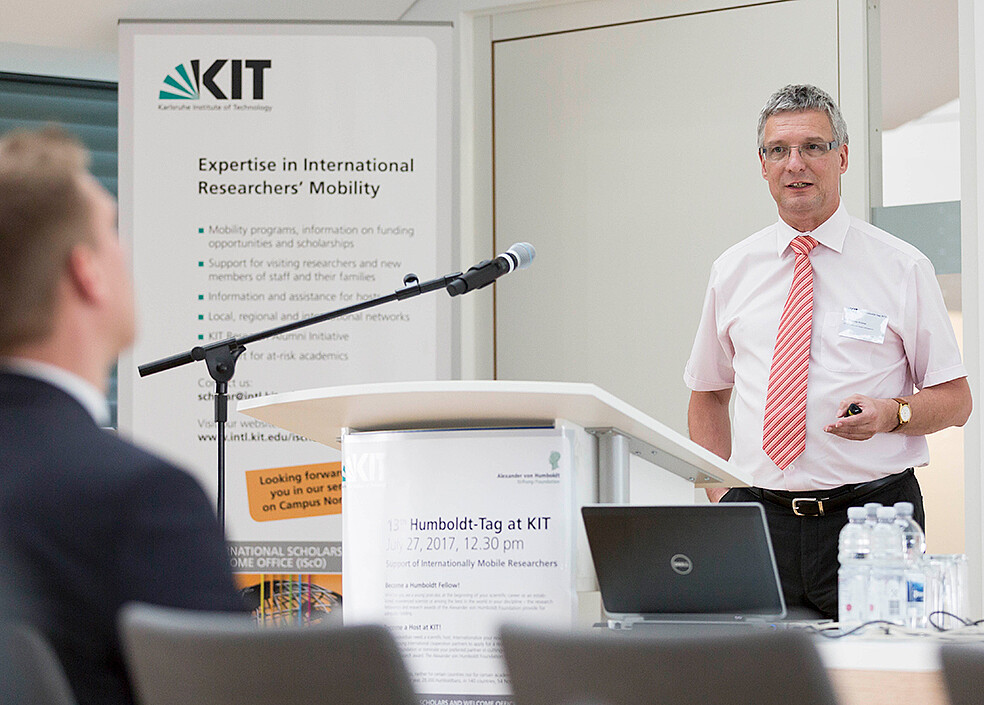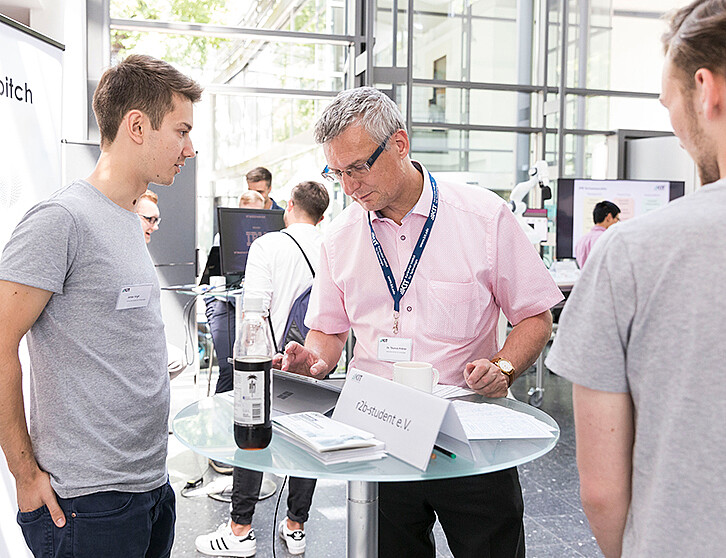Published on September 14, 2021
Professions in technology transfer: Licensing manager
At KIT, the Licensing Management group of Innovation and Relations Management (IRM) negotiates these licensing agreements and consults institutes and other departments on contract design for research cooperations and contract research. We met senior license manager Dr. Thomas Kröner to talk to him about his profession.

How do you become a license manager? How did you get into this profession?
Thomas Kröner: I came to this profession by chance in 1996. After completing my PhD in physics, I was a postdoc for two years at the Karlsruhe Research Center (now KIT) at the Institute of Technical Physics. I didn't want to stay in research and was looking for an opportunity to work at the interface between science and industry. The job advertisement for a license manager at the research center came at the right time. The job description sounded very interesting, I could imagine. I applied and got the job. Now I have been a license manager for more than 25 years and have headed the "Licenses group" for more than 10 years.
I started as a career changer, as is the case with many license managers at universities, but also in industry. The foundation is usually a science or engineering degree and the legal know-how is acquired by "learning by doing".
Why did you choose a career in technology transfer?
Thomas Kröner: Technology transfer is an interesting challenge for me. In license negotiations, we see whether a company is interested in the technology developed at KIT and is willing to pay money for its use. For me, it is a fulfilling task to support researchers in commercializing their work results. I always find negotiations with industry exciting because each case and the parties involved are very individual.
„It is always a good feeling to bring the perspectives from both worlds to a consensus and to contractually fix the collaboration.“
Dr. Thomas Kröner
What are the requirements for this profession? What skills should you have?
Thomas Kröner: A license manager works at the interface of natural/engineering sciences, economics, and law. At KIT, all employees in license management have a natural science or engineering background. On the more direct path, a degree from the field of business law would be conceivable today, although the focus here is usually on copyright, trademark law, and design protection. License agreements are contracts of their own kind and therefore rather a niche.
In any case, one should master the "language of science" and at the same time understand the requirements of the market. An interest in legal issues is absolutely essential. The license manager negotiates the contracts directly; for more in-depth legal issues, we are supported by lawyers. You should also have negotiating skills, stress resistance and strong communication skills to keep calm in a negotiation. Sometimes a negotiation is not just a businesslike affair. You have to be able to deal with this and master the situation confidently.

What does a typical day look like for you?
Thomas Kröner: This can be drafting, commenting or negotiating a draft contract. Specifically, the contract regulates the granting of the rights of use, the license fees to be paid for this, and further details, such as auditing law, billing modalities and warranty. In this regard, I am in regular dialogue with internal and external partners. There is a particularly intensive exchange with colleagues from the patent department, law department and technology transfer department: about inventions and their exploitation potential, commercialization and negotiation strategies.
However, the work does not end with signing the contract. Often, KIT generates further intellectual property rights that might be interesting for an existing licensee; then we offer these to the licensee and include them as further contractual intellectual property rights. Then there are licensees who restructure their companies or unfortunately go into insolvency. There is still work to be done in license management there, too. In addition, we consult the law and sales departments at KIT on issues relating to the commercialization of intellectual property rights or, at the beginning of a year, we audit the royalty statements.
Why does KIT need licence managers?
Thomas Kröner: KIT holds industrial property rights and know-how from its in-house research. Every year, new industrial property rights are applied for and granted by KIT. A license manager exploits this intellectual property on behalf of KIT and thus makes the economic utilization of research results possible. By granting licenses or selling intellectual property rights, free third-party funds are raised for the institutes concerned, which additionally promote science. Licensing is also lucrative for the inventors because they receive 30% of the revenues generated as invention royalty.
What do you like about your job?
Thomas Kröner: For me, it is ideal to combine research topics with legal and economic aspects. And to see that products, sales, and jobs are ultimately generated from KIT inventions. With the foundation of KIT in 2009, we also have licensing to spin-offs on the agenda more and more often. This allows us to experience this path to the market much more closely.
As a license manager, I can work freely and self-organized. Nevertheless, I appreciate the proximity to the heterogeneous group of colleagues in order to exchange views on current issues. When it comes to drafting and negotiating contracts, my creativity is always in demand. That makes the job exciting even after so long.
The interview was conducted by Karola Janz.

comments about this article
No Comments